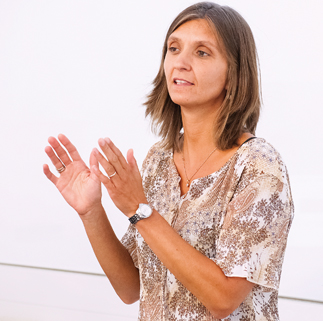Many organisations and multi-national companies are mostly blind to fraud. And an emerging industry of ‘fraud specialists’ is taking advantage, says fraud investigator and doctoral student Veronica Morino.
She points to an increasing gap between the reality of fraud and how people and organisations are trying to counteract it. She has co-authored a book and published articles in a practitioner journal on fraud and corruption in organisations; and is reading for her PhD at Leicester University.
Ms Morino, pictured, said: “Organisations have always been affected by fraud and have, through the years, established a series of protective measures. However, the general consensus is that, in spite of the increased volume of governance, fraud is not decreasing nor have companies proved able to deal with it more effectively.
“I think that there is an important distinction to be made between protective measures as generally practiced today, and real resistance. This requires including an organisational and sociological dimension in a holistic response to fraud management.
“With my research I would like to offer this new perspective and help organisations understand where they stand today and how they can take their anti-fraud work to the next level.”
Ms Morino, who was born in Florence and studied in Rome, has spent the last 16 years detecting, investigating and preventing corporate fraud and corruption. She says she previously believed that she was helping organisations to develop anti-fraud and corruption programmes which made a difference.
“I arrived at the point where I realised that there was an increasing gap between the reality of fraud and how people and organisations were trying to counteract it. I started wondering whether it would be possible to effectively combine the work and studies I had done earlier on organisational culture with my experience as investigator and thus find some answers which could possibly contribute to a positive change of the status quo.”
Ms Morino said true resistance requires fraud and corruption to be recognised and regarded as both pervasive and occurring all the time – but also as deviant and undesirable behaviour.
She said: “Fraud touches deep cultural values and is at the same time both common but also not tolerated and morally reproached in every historical period, geographical region and cultural context. Nevertheless, people don’t always seem able to identify it as happening to them or by them. This is a paradox which needs to be accepted in order to recognise fraud and corruption for what it really is.”
The key is to understand what needs to be done to reach a consensus on what is fraudulent and what is not. Only once this is in place, can people in organisations formulate their own response, she suggests.
“The more I explore things and the more it seems that all these overly complicated rules, procedures, policies, internal controls, risk assessments and monitoring activities are actually taking us in the opposite direction. Rather than preventing fraud this leads to even more new regulations, procedures, controls and so on. That makes me wonder because, as I wrote in one of my latest articles, the secondary beneficiaries of fraud and corruption (after the fraudsters of course) are the ‘fraud specialists’, who might reflect, the more ills, the more we have to pay the bills?
“More and more people from both worlds see the benefit of a dialogue between academics and practitioners. It has been very interesting to test some of the concepts that I have been exploring as a PhD student at my training sessions with corporate audiences. Feedback from those sessions has allowed me to further develop my work. Corporates are really interested and often want to use the concepts before they are academically tested so I have found myself holding back at times. It feels like a win-win for both universes.”
For more visit the University of Leicester website.










